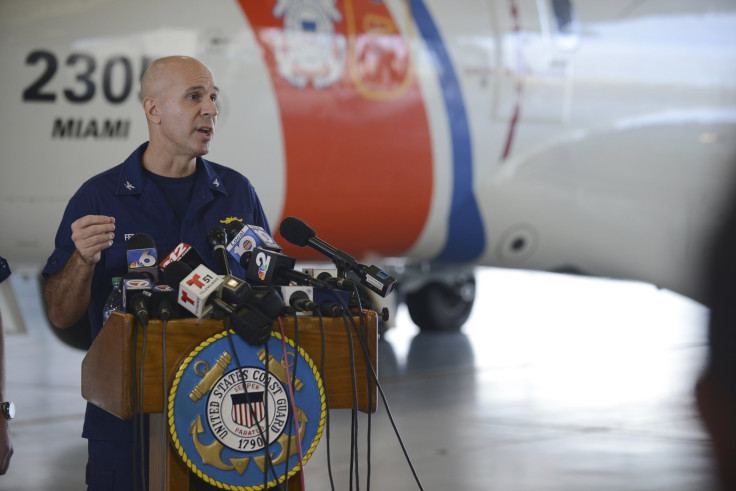Hurricane Joaquin 2015: US Coast Guard Ends Search For Missing Cargo Ship's Crew

By Susan Cooper Eastman
(Reuters) -- The U.S. Coast Guard said on Wednesday it was ending its search for the missing crew of an American cargo ship that sank off the Bahamas last week after sailing into the path of powerful Hurricane Joaquin.
The air and sea search for possible survivors would end at sunset on Wednesday night, six days after communication was lost with the ship and the 33 people aboard, Coast Guard Captain Mark Fedor told a news conference in Jacksonville, Florida.
Federal safety officials began an investigation on Tuesday into what maritime experts have called the worst cargo shipping disaster involving a U.S.-flagged vessel in more than 30 years.
"Everybody's crying. It's not a good situation," said Terrence Meadows, 36, a seaman who knew some of the missing crew and joined grieving relatives Wednesday at the Seafarers International Union hall in Jacksonville.
"To be absolutely honest, I knew everyone was dead. We don't get trained to survive in a hurricane in the ocean," Meadows said.
The owners of El Faro, Tote Maritime Puerto Rico, believe it sunk last Thursday after suffering engine failure during its weekly run from Jacksonville to San Juan, Puerto Rico, leaving it at the mercy of Joaquin off the southern Bahamas.
Officials had acknowledged earlier that chances of finding survivors were remote, given that the 790-foot (240-meter) ship, piled high with containers, disappeared in the middle of a ferocious storm with high seas whipped up by winds of 130 miles (215 km) per hour.
So far, the body of only one presumed crew member has been found, amid two large debris fields. That left 32 people aboard the ill-fated ship, which was carrying 28 American crew members and five Polish contractors, unaccounted for.
The U.S. National Transportation Safety Board will continue searching for the El Faro, though deep seas would likely hamper attempts to find the ship, said an official spearheading the investigation.
The stretch of ocean where the ship is believed to have gone down, part of a heavily transited channel for large ships, is nearly three miles (5 km) deep.
NTSB Vice Chairman Bella Dinh-Zarr said her team will be listening for the pinging of El Faro's voyage data recorder, or VDR, which is similar to the black boxes on airplanes.
The device preserves the last 12 hours of engine orders and communications from the bridge. It was supposed to start pinging its location as soon as it touched water, Dihn-Zarr said, but searchers have yet to hear it.
Dinh-Zarr said the decisions of El Faro's captain and the route the ship took, as well the pressure to deliver its cargo, will be scrutinized as part of an investigation into "the human factor" behind the disaster.
"We will be studying the meteorological conditions and all of the factors that went into the decision-making to sail on that day and to continue to sail," she said.
The investigation will also look at when and why the engine failed, and if there were problems before the ship left port, she said.
(Writing by David Adams in Miami; Editing by Lisa Von Ahn and Tom Brown)
© Copyright Thomson Reuters 2024. All rights reserved.





















